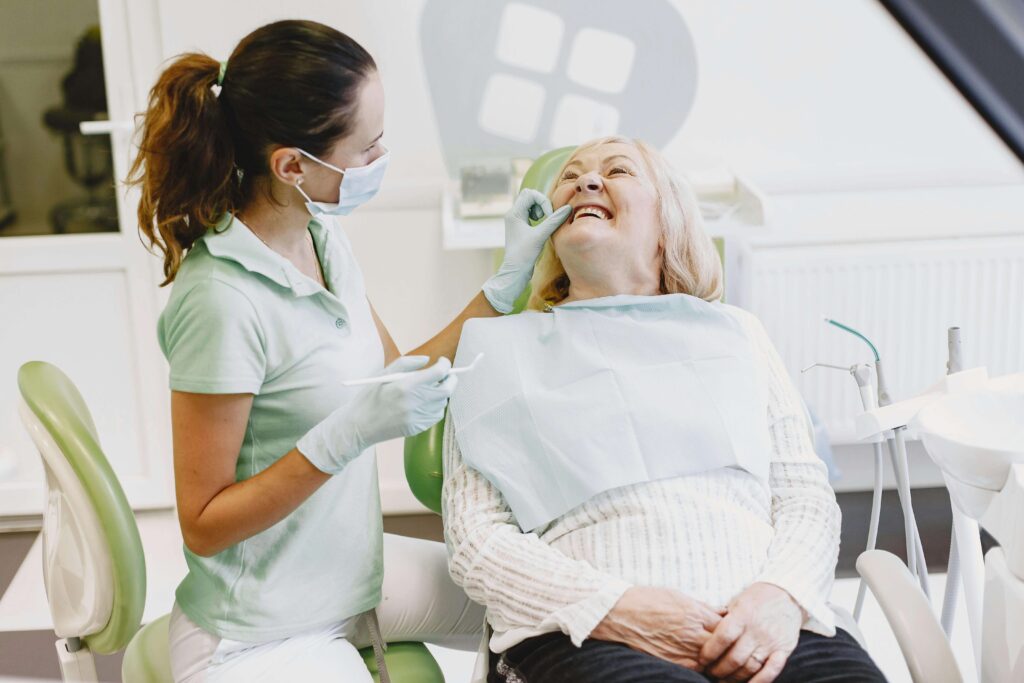Maintaining good dental health is essential at any age, but it becomes even more crucial as we age. Seniors face unique dental challenges, such as tooth loss, gum disease, and tooth decay. Implementing proper oral hygiene practices and paying attention to dietary choices can help seniors maintain their natural teeth, prevent oral health issues, keep their gums healthy, and enhance their quality of life. As an older adult, you are at an increased risk of developing oral cancer, especially if you use tobacco and nicotine products. Here are some effective dental health tips for seniors to keep their mouths healthy and smiles bright.

1. Stay Hydrated to Combat Dry Mouth
The first of our dental health tips is about dry mouth. Dry mouth is a common issue among seniors that can lead to various dental problems, including tooth decay and gum disease. As we age, saliva production decreases, often due to medications or medical conditions. Since saliva helps to wash away food particles and neutralize acids that cause dental plaque, reduced saliva can increase the risk of tooth decay and enamel erosion.
Drink at least six to eight glasses of water daily to maintain saliva production and keep your mouth healthy. Increased water intake helps flush away food particles and keeps your mouth moist. Chewing sugar-free gum can also stimulate saliva production and reduce the discomfort of dry mouth.
2. Prevent Tooth Loss with Proper Oral Hygiene
One of the most significant concerns for seniors is tooth loss, which can affect their ability to chew, speak, and maintain a healthy smile. Preventing tooth loss requires diligent oral hygiene practices, including regular brushing and flossing. Using an electric toothbrush can provide a more thorough cleaning by effectively removing plaque buildup, reducing the risk of gum disease, and keeping teeth strong.
In addition to brushing, water flossers can help seniors clean their teeth, especially for those who have trouble using traditional floss. Floss holders are another alternative to ensure that food particles are removed from hard-to-reach areas, minimizing the risk of tooth decay.
3. Protect Your Gums to Prevent Gum Disease
Gum disease, particularly periodontal disease, is a leading cause of tooth loss in seniors. It develops when plaque buildup is not properly managed, leading to inflamed and bleeding gums. Advanced gum disease can cause gums to recede and teeth to loosen, leading to tooth loss.
To protect your gums, it’s essential to maintain an effective oral hygiene routine that includes brushing twice a day with fluoride toothpaste and flossing regularly. A soft-bristled toothbrush is recommended for gentle cleaning without irritating the gums. Additionally, using an antibacterial mouthwash can help reduce plaque and prevent gum disease.
4. Prioritize Regular Dental Visits
Regular dental checkups are vital for seniors to monitor their oral health and detect potential problems early. Dental professionals can spot signs of gum disease, oral cancer, and other oral health issues before they become more severe. Seniors should schedule dental appointments at least twice a year for professional cleanings and examinations.
If you have dental insurance, it’s important to take full advantage of your benefits for routine dental visits. Even if you don’t have coverage, many dental services offer affordable options for seniors to receive the dental care they need. Don’t wait until a dental issue worsens before seeking treatment.
5. Maintain a Healthy Diet for Strong Teeth
Your diet plays a significant role in your dental health. Consuming foods rich in calcium, such as dairy products, leafy greens, and fortified cereals, helps keep teeth strong and prevents enamel erosion. A balanced diet that includes plenty of fruits, vegetables, and whole grains provides the nutrients necessary to support your oral health.
Avoid sugary foods and acidic foods, which can lead to tooth decay and weaken tooth enamel. Drinking glasses of water after meals helps rinse away food particles and reduce the harmful effects of sugary or acidic substances. Additionally, seniors should consider reducing their consumption of tobacco products, as they increase the risk of gum disease, oral cancer, and other health issues.
6. Address Tooth Sensitivity and Other Dental Issues
As you age, you may notice increased tooth sensitivity, which can result from receding gums, worn tooth enamel, or untreated dental issues. Using fluoride toothpaste designed for sensitive teeth can help reduce discomfort while providing protection against tooth decay.
Seniors experiencing dental issues such as tooth sensitivity or bad breath should seek medical advice from their healthcare provider or dental professional. These problems may indicate more significant oral health concerns, such as enamel erosion or gum disease, which require prompt attention.
7. Consider the Benefits of Saliva Substitutes and Alcohol-Free Mouthwashes
For seniors struggling with dry mouth, saliva substitutes can be a helpful solution to maintain a healthy mouth. These products mimic natural saliva and help keep the mouth moist, reducing the risk of tooth decay and gum disease. In addition, alcohol-free mouthwashes are gentle on sensitive gums and teeth while still providing protection against plaque buildup and bad breath.
8. Embrace an Oral Hygiene Routine for a Healthy Smile
Maintaining a consistent oral hygiene routine is essential for seniors to prevent dental issues and ensure long-term dental health. This includes brushing twice a day with fluoride toothpaste, flossing regularly, and using mouthwash to keep your mouth clean and free of plaque.
Incorporating the right dental care products, such as a soft toothbrush, electric toothbrush, and fluoride toothpaste, can make a significant difference in maintaining healthy teeth and gums. Regular brushing and professional cleanings are the foundation of good oral health, helping to prevent gum disease, tooth decay, and other oral health issues.
9. Manage Overall Health Conditions for Better Dental Health
Many health conditions, such as heart disease, diabetes, and osteoporosis, can impact dental health. Seniors should work closely with their healthcare provider to manage these conditions and understand how they may affect oral health. For instance, individuals with diabetes have a higher risk of developing gum disease, while osteoporosis can weaken the bones that support teeth.
By staying proactive about both your dental care and overall health, you can reduce the risk of tooth loss, gum disease, and other complications that may arise from underlying medical conditions.
10. Stay Informed and Seek Regular Dental Care
The last of our dental health tips is to seek regular dental care. Seniors should stay informed about the latest dental care tips and treatments available to them. Whether they learn about the benefits of using a water flosser or understand the importance of fluoride toothpaste, staying educated on dental care can empower seniors to take better care of their teeth and gums.
Regular visits to the dentist for cleanings, exams, and dental treatments are essential for maintaining a healthy smile and preventing dental issues. With proper care, seniors can enjoy strong teeth, healthy gums, and improved quality of life well into their golden years.
By following these senior dental health tips, you can ensure that your natural teeth stay healthy, your gums remain strong, and your smile stays bright for years to come.







